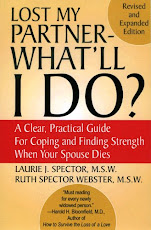
4/24/23
7 tips for deciding what to do with your spouse/partner's belongings

How do you know when the time is right to clear out your spouse/partner's belongings?
This important decision has few clear guidelines. Well-meaning family and friends may pressure you to "get rid of" cherished possessions you don't feel ready to let go of. Or you yourself may feel anxious to "get rid of" painful reminders of your loss. But what's the rush? We urge you not to dispose of anything before you first consider these tips:
1. Trust your own instincts about the right time to tackle this difficult process. Take your time and don't rush. The hasty decision you make today may become tomorrow's regret.
2. Ask a trusted family member or friend for help in packing things up and/or making arrangements.
3. Set a realistic timetable for completing this process. Make allowances for how grief is affecting you. Assume there will be times when, despite your best intentions, you won't feel up to dealing with this.
4. Start by first getting rid of items you feel least attached to. Try to imagine what your spouse would want done with their possessions.
5. Don't kid yourself into believing that by getting rid of painful reminders, you can avoid the pain. Allowing yourself to feel the loss is an important part of getting through it and is actually emotionally beneficial in the long run.
6. Hold on to whatever possessions give you comfort right now.
7. Move items you're undecided about to another location, such as rented storage. This allows you some breathing space before making more permanent decisions.
Be sure to give yourself the time you need and trust your instincts about what's best for you.
4/20/23
getting back to work; part 2: your reactions

In Part 1 of this excerpt from Lost My Partner – What’ll I Do? we discussed the various ways your coworkers may react to you once you return to work.
We now focus on your own reactions to being on the job following your loss.
- Be prepared for unexpected tears. During the first week at work, there may be moments when you find yourself tearful. This lessens with time, but for now, give yourself permission to retreat to the restroom or other secluded area for a good cry or to compose yourself. Many find giving themselves this release helps relieve the pressure of having to control feelings of grief while at work.
- Be prepared to experience some difficulty with memory and concentration. These are common but temporary grief reactions. While you may feel frustrated and anxious about this change, try to be patient with yourself. It helps to reread and/or go over information or tasks more than once.
- Your boss or coworkers may have unrealistic expectations. Assure them you’re doing your best, and that any slowdown on your part is temporary.
Despite how others may react, it’s important for you to recognize that what is going on is normal and temporary. With time and patience (especially your own), you will regain the capacity you used to have to do your job.
4/17/23
going back to work; part 1: coworkers' reactions

(Excerpted from our book, Lost My Partner – What’ll I Do?)
Returning to a job after a spouse’s death is a step that tends to be anticipated with eagerness, dread, or both, at different times.
The workplace can seem like a familiar well-ordered refuge where you find many hours of distraction away from your pain.
On the other hand, it can represent the ordeal of work pressures, coworkers’ reactions, and a boss’s unrealistic expectations.
Here are some ways to make it through a work day while you’re grieving:
- While your private world has been drastically changed, your workplace has gone along in its usual way. You may, therefore, initially feel out of sync with the rest of your coworkers.
Here are some ways to make it through a work day while you’re grieving:
- While your private world has been drastically changed, your workplace has gone along in its usual way. You may, therefore, initially feel out of sync with the rest of your coworkers.
- Coworkers will look to you for their cues. Others usually feel awkward about expressing feelings or knowing the “right thing” to say. How you respond to the first expressions of sympathy will convey a message to other coworkers about how and if you want to discuss the loss. Some possible responses include: “Thank you. It’s difficult to talk right now – maybe later.” Or “I appreciate your concern.” Remember, the choice is yours.
- Some coworkers may not mention the loss. This can feel hurtful and even insulting. Try to keep in mind that people are often afraid of “reminding” or upsetting a grieving person. Expressing sadness can seem especially threatening in a work setting, where personal distress is supposed to take a back seat to the demands of business.
In Part 2, learn tips for dealing with reactions of your own that may crop up at work
In Part 2, learn tips for dealing with reactions of your own that may crop up at work
Subscribe to:
Posts (Atom)
